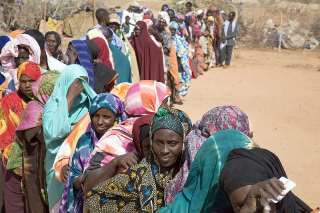Sudan’s Kassala state governor pleads for EU help to combat human trafficking
November 7, 2013 (KHARTOUM) – The governor of Sudan’s Kassala state, Mohamed Youssef Adam, has asked the European Union (EU) to assist his government in combating human trafficking following the death of hundreds of Eritrean migrants last October when their boat sank off the cost of Italy.

The United Nations High Commission for Refugees (UNCHR) says that 1,800 refugees and asylum seekers arrive monthly in eastern Sudan fleeing the Eritrean government.
Tomas Ulincy, head of the EU’s delegation in Sudan expressed interest in cooperating with Sudan and the neighbouring countries on human trafficking.
The Italian ambassador, Armando Barucco, stressed the importance of cooperating with the Sudanese authorities to prevent human trafficking.
Law enforcement agencies in Sudan and Italy have discussed ways of cooperation in fighting human trafficking and are expected to soon sign an agreement on this topic.
Last July, the Sudanese cabinet endorsed a draft bill on combating human trafficking in line with previous government pledges to tackle the issue this year.
The law details human trafficking offenses and penalties while specifying measures aimed at protecting victims and witnesses and maintaining information confidentiality.
The US state department’s 2012 report on human trafficking identifies Sudan as a “source, transit, and destination country for men, women, and children subjected to forced labor and sex trafficking”.
“The Government of Sudan does not fully comply with the minimum standards for the elimination of trafficking and is not making significant efforts to do so. While the government took some initial steps during the reporting period to acknowledge the existence of trafficking, draft anti-trafficking legislation, prosecute suspected traffickers, demobilize and reintegrate child soldiers, and waive overstay fines for foreign domestic workers, its efforts to combat human trafficking through law enforcement, protection, or prevention measures were undertaken in an ad hoc fashion, rather than as the result of strategic planning” the report said.
The US called on Khartoum to “enact a comprehensive legal regime to define and address human trafficking crimes and harmonize various existing legal statutes; increase efforts to investigate suspected human trafficking cases, increase prosecution of trafficking offenses, and convict and punish trafficking offenders”.
Eastern Sudan in particular is believed to be serving as a passage to migrants from Eritrea, Ethiopia and Somalia who seek to reach Europe with the help of human smugglers.
(ST)
